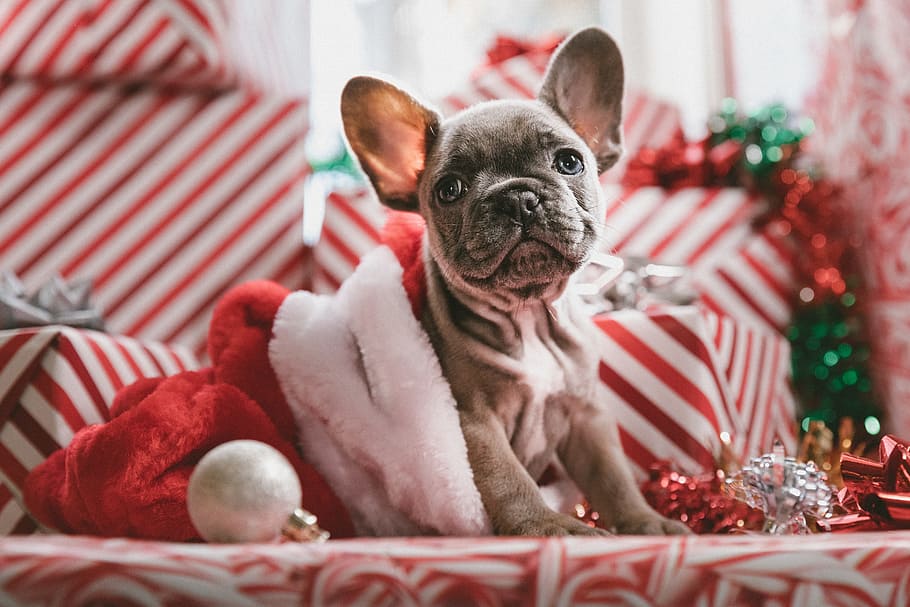Tips for a Pet-Safe Howliday Season
It’s the time of year when a festive holiday spirit brings together friends and family in celebration, but this happy time can also bring unintentional hazards to your pet’s environment.

Luckily, with advance preparation, most risks can be mitigated to ensure that your pet’s holiday experience is as joyful as any human’s!
Kit Darling, infection control coordinator at the Texas A&M College of Veterinary Medicine & Biomedical Sciences (CVM), shares with owners how to ensure that their pet has a safe and positive holiday experience.
Holiday decorations are an important aspect of introducing winter cheer to a gathering. However, some pretty trinkets—such as ornaments, bows, ribbons, tinsel, and lights, as well as electrical cords—might have less-than-pretty effects on your pet’s health if ingested.
“Your pet may think holiday decorations are toys to play with or to chew,” Darling said. “Please keep all of these out of your pet’s reach. Eating holiday decorations may cause signs such as vomiting, diarrhea, depression, or abdominal pain; chewing lights or electrical cords may cause an electrical shock resulting in burns, difficulty breathing, loss of consciousness, and even death.”
More natural decorations may also pose a threat to the well-being of your pet. Holiday plants such as holly, mistletoe, lilies, Japanese Yew, Christmas rose, and amaryllis can be dangerous to pets.
“The needles and the oils from a Christmas tree also can cause skin irritation or gastrointestinal upset,” Darling said. “Do not allow your pets to drink the water around the Christmas tree; it may be contaminated with fertilizers or bacteria that can cause gastrointestinal upset.”
Additionally, foods served at your celebration that are safe for you may still be dangerous for your pet. Owners should avoid feeding pets fatty foods such as turkey skin, meat fat and gravy, bones, and fried foods. Other snacks that may cause serious consequences if consumed by a pet include grapes, raisins, onions, garlic, chives, chocolate, macadamia nuts, yeast dough, alcohol, coffee, caffeine, and xylitol.
“Keep food out of your pet’s reach,” Darling said. “Do not allow counter or table surfing. Place trash in a closed-lid can in a secure location.”
Pet owners should keep an eye out for open doors and double-check that their pet has proper identification, such as a collar or microchip, in case their furry friend slips out accidentally. It is also important that owners have contact information for a veterinarian easily accessible.
“During the holidays, our routine changes as we have family and friends visit. This can be confusing, stressful, or frightening to our pets,” Darling said. “Even pets that enjoy people may become overwhelmed with lots of guests. Allow your pet to have access to a comfortable, quiet place away from all of the commotion and when guests are arriving or leaving.”
To help relieve stress in both pet and owner, owners should consider taking the time to provide their pet with extra attention and exercise. It is important to remember that although pets provide many emotional and physical benefits, they are a serious responsibility.
“You may think a new puppy or kitty is a great present, but the holidays are a busy time,” Darling said. “It might be better to acquire a new pet at a less hectic time. If you are thinking of giving someone a pet, ask the person if they want a pet or if it is a good time for them to have a new pet.”
The holiday season is a wonderful time to show appreciation to those you love, furry friends included! With a few precautions to remove pet hazards, there is no reason your pet can’t be included in your holiday celebration.
Pet Talk is a service of the College of Veterinary Medicine & Biomedical Sciences, Texas A&M University. Stories can be viewed on the web at vetmed.tamu.edu/news/pet-talk. Suggestions for future topics may be directed to editor@cvm.tamu.edu.


